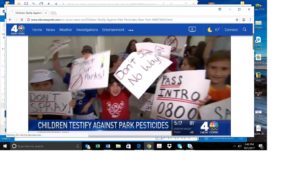02
Oct
Schoolchildren Lead the Charge Against Roundup and Other Toxic Pesticides in New York City Parks
(Beyond Pesticides, October 2, 2017) Elementary school students at New York City’s PS 290 are taking a stand against toxic pesticide use in New York City parks, supporting Intro 800, a  bill introduced by Manhattan Councilmember Ben Kallos. “We’re going to make a great big fuss,” the children in Mrs. Paula Rogivin’s kindergarten class chanted in a skit performed in front of the NYC Committee on Health this week. Since New York City (NYC) passed Local Law 37, Pesticide Use by City Agencies, in 2005 to stop toxic pesticide use on City owned and leased land, it turns out that some pesticides known to be hazardous were not captured by the law. As a result, the proposed legislation is intended to strengthen restrictions to ensure more comprehensive restrictions that limit pesticides to biological pesticides.
bill introduced by Manhattan Councilmember Ben Kallos. “We’re going to make a great big fuss,” the children in Mrs. Paula Rogivin’s kindergarten class chanted in a skit performed in front of the NYC Committee on Health this week. Since New York City (NYC) passed Local Law 37, Pesticide Use by City Agencies, in 2005 to stop toxic pesticide use on City owned and leased land, it turns out that some pesticides known to be hazardous were not captured by the law. As a result, the proposed legislation is intended to strengthen restrictions to ensure more comprehensive restrictions that limit pesticides to biological pesticides.
Local Law 37 restricts the use of acutely toxic and carcinogenic pesticides as defined by the U.S. Environmental Protection Agency (EPA), and developmental toxicants as defined by the state of California under Prop 65. Exemptions allowing the use of these pesticides are granted based on a waiver review process that requires evidence that the chemicals are necessary to protect public health. Otherwise, City agencies are encouraged to use less toxic products in and around structures and green spaces owned by the City. The law also requires NYC agencies to record and report their pesticide use, and each year the City publishes a Pesticide Use Report summarizing total pesticide amounts applied.
Intro 800 would amend Local Law 37 to limit the use of pesticides on New York City property to only biological based pesticides and those currently exempt from the requirements of the law. Much of the reform efforts are driven by the City’s increased use of the weedkiller glyphosate (Roundup) after the law was passed. “The World Health Organization found that it was a carcinogen, so we introduced legislation right away,” Councilmember Kallos said in an interview with CBS New York. Glyphosate use in NYC spiked in 2009, and declined thereafter, yet still has represented over 50% of pesticide use by City agencies over the past several years. In 2016, glyphosate was applied over 1,000 times by the NYC Department of Parks and Recreation.
Beyond Pesticides provided testimony in support of Intro 800, however suggested some clarifying amendments that would provide additional tools for landscapers to achieve aesthetic goals in NYC parks without sacrificing public health. This includes a request to include under exempt materials products that are certified organic under the U.S. Department of Agriculture’s National Organic Program. These products, which can be viewed and used in your own lawn care practices on Beyond Pesticides’ Organic Compatible Product List, are approved by the independent stakeholder National Organic Standards Board and are reviewed for their safety and essentiality within an organic land care system. Though biological pesticides cover a majority of least-toxic products available on the market, many active ingredients are specific to agricultural uses, and some are genetically engineered proteins used in crops, and thus not relevant to City pest management.
At the end of the day, student Jesse Balsam summed up the core importance of Intro 800 like only a bright young kid can. “I think this is a good law that should pass, because pesticides are bad for people,” the student told CBS New York. Indeed, given continued use of toxic pesticides in NYC Intro is thus critical to the protection of community health, particularly children, elderly, and vulnerable population groups that suffer from compromised immune and neurological systems, cancer, reproductive problems, respiratory illness and asthma, Parkinson’s, Alzheimer’s, diabetes, and learning disabilities.
Councilmember Kallos told CBS New York that he hopes to pass the legislation by year end. If you live in NYC and would like to show your support to your City Councilmember and urge them to pass Intro 800, go here to send them a letter, and consider following up with a phone call.
Get Beyond Pesticides take on Intro 800 by reading testimony presented this week to the NYC Council Committee on Health. For more information on the hazards of glyphosate use, see Beyond Pesticides Chemical Gateway page on the herbicide.
All unattributed positions and opinions in this piece are those of Beyond Pesticides.
Source: CBS New York.










